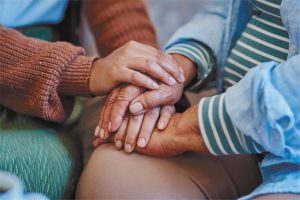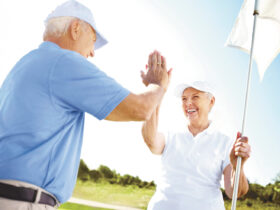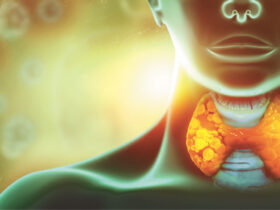By Steven Stein, MD – Board-certified Psychiatrist
 Loneliness and grief are common experiences that can affect us all but are often more prominent in older adults. Simply put, loneliness is the feeling of being disconnected and isolated from others, while grief is the emotional response to a loss, such as the death of a loved one or a change in life circumstances. Both experiences can have a significant impact on our mental and physical health as we age and can seriously impact our overall health and further lead to major depression. Educating oneself by building awareness and insight into the signs of loneliness and grief in yourself or a loved one can allow you to best manage the situation in hopes of better outcomes, quality of life and peace of mind. Managing this early can also help prevent or reduce the progression into complicated grief and depression which often require further psychiatric evaluation and care.
Loneliness and grief are common experiences that can affect us all but are often more prominent in older adults. Simply put, loneliness is the feeling of being disconnected and isolated from others, while grief is the emotional response to a loss, such as the death of a loved one or a change in life circumstances. Both experiences can have a significant impact on our mental and physical health as we age and can seriously impact our overall health and further lead to major depression. Educating oneself by building awareness and insight into the signs of loneliness and grief in yourself or a loved one can allow you to best manage the situation in hopes of better outcomes, quality of life and peace of mind. Managing this early can also help prevent or reduce the progression into complicated grief and depression which often require further psychiatric evaluation and care.
1. Look for signs of social isolation: people who are lonely may avoid social interactions, withdraw from activities they once enjoyed, or have limited contact with family and friends.
2. Monitor for physical changes: Loneliness and grief can also have physical effects, such as changes in eating and sleeping patterns, weight loss, and fatigue.
3. Pay attention to emotional cues: Elderly individuals who are experiencing loneliness and grief may express feelings of sadness, hopelessness, or worthlessness. They may also have difficulty concentrating, experience mood swings, or feel agitated.
Managing loneliness and grief in the older population:
1. Seek professional help: In many cases, professional help can be successful at addressing the complex emotions associated with loneliness and grief and can overall benefit the individual while helping avoid progression into clinical depression. This may involve working with a therapist or counselor, who can offer additional support and guidance.
2. Encourage social connections: One of the most effective ways to combat loneliness is by promoting social connections. This can be achieved by encouraging participation in community events, connecting them with friends and family, or even introducing them to new hobbies or interests.
3. Provide emotional support: Individuals who are experiencing grief may benefit from emotional support, such as listening to their concerns, validating their feelings, and offering words of comfort.
4. Connect with support groups: Support groups can provide a safe and supportive environment for individuals to share their experiences and connect with others who are going through similar challenges.
5. Address physical health needs: Addressing physical health needs, such as aiding with daily living activities or addressing medical concerns, can help improve the overall well-being of individuals and reduce feelings of loneliness and grief.
Complicated grief is a condition where a person experiences intense and prolonged grief after a significant loss, which interferes with daily functioning. While grief is a normal reaction to the loss of a loved one, it can become complicated when the feelings of sadness, guilt, anger, and despair persist for an extended period. In contrast to major depression, complicated grief is triggered by a specific event, such as the death of a loved one, and is often associated with feelings of longing, yearning, and preoccupation with the departed.
Persons with complicated grief may experience a range of physical and emotional symptoms, including difficulty sleeping, loss of appetite, and an inability to engage in daily activities. They may also experience feelings of numbness, detachment, and hopelessness, which can make it difficult to seek help or support.
Major depression is a common mental health disorder that according to the National Institutes of Health has a prevalence of 21 million adults in the United States. This represents 8.4% of the adult population. Clinical depression affects practically all adults from varying walks of life, ages, genders, classes, and races, but according to the National Council on Aging, adults age 85 and above are the age group most likely to develop debilitating depression. It’s characterized by a persistent feeling of sadness, hopelessness, and a loss of interest in activities that were once pleasurable. People with major depression often experience changes in their appetite and sleep patterns, as well as difficulty concentrating and making decisions. They may also feel fatigued and have low energy levels, which can affect their ability to carry out daily activities.
While depression can be caused by a variety of factors, including genetic, environmental, and psychological factors, it can also be triggered by stressful life events, for example, the death of a loved one, change in independence, change in mobility, change in physical or medical health, divorce or even change in living and/or working situations. Depression can have a significant impact on a person’s life, making it challenging to maintain relationships, work, other daily activities and can limit one’s overall quality and enjoyment in life.
In conclusion, loneliness, grief, and depression are very common experiences for many and they can have a significant impact on mental and physical health. By identifying the signs of loneliness and grief and taking steps to manage these experiences, we can help improve our overall well-being, and quality of life while promoting healthy aging and reducing the frequency and severity of depression. Encouraging social connections, providing emotional support, connecting with support groups, addressing physical health needs, and seeking high quality, non-judgmental professional and psychiatric help are all effective strategies for managing loneliness and grief. It’s essential to seek professional help if you or someone you know is experiencing symptoms of depression or prolonged and intense grief after a significant loss, as treatment can help.
(941) 202-1999
www.tidewatertotalmindcare.com
3333 Clark Rd, Ste 100, Sarasota, FL 34231







